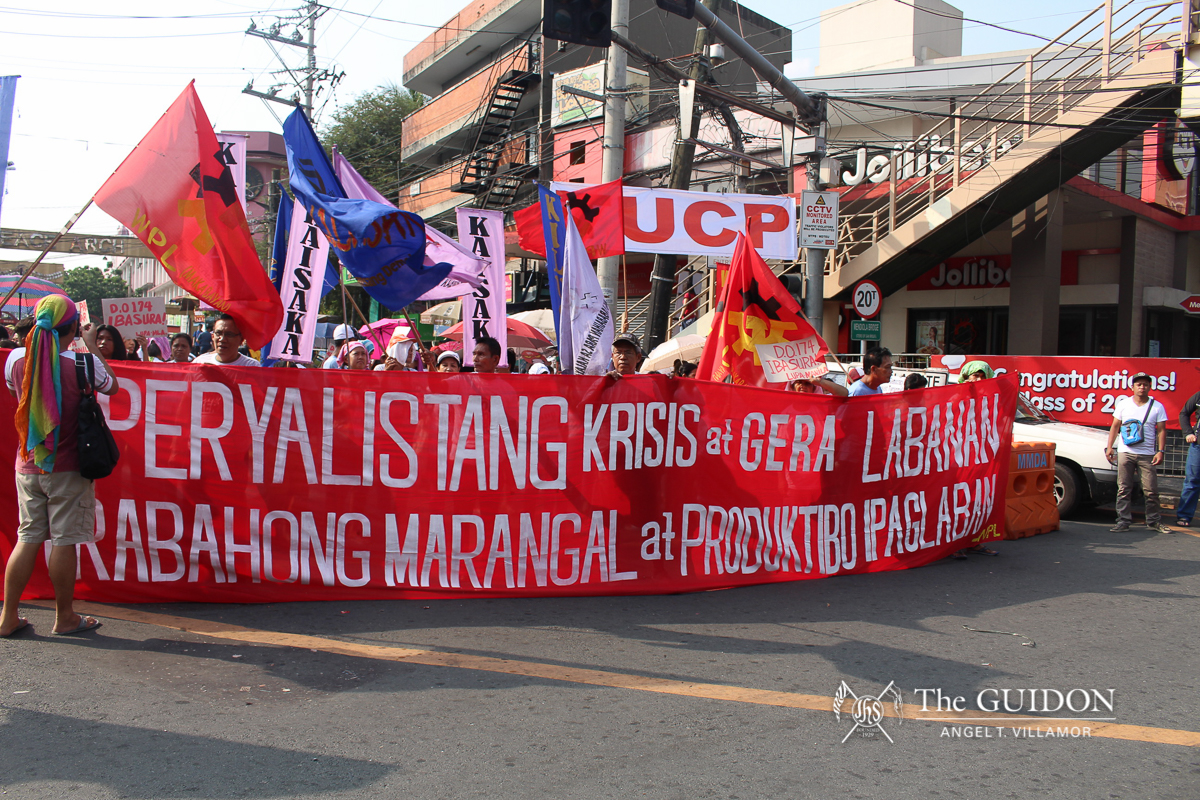UNDER THE scorching heat of the sun, hundreds of protesters converged in front of the Mendiola Peace Arch on Labor Day to express their call to abolish labor contractualization, also known as endo (end-of-contract).
Protesters marched from the Welcome Rotunda to Mendiola where a program was spearheaded by leaders from labor associations and party-list groups.
This was one of the many protests held in Mendiola and throughout rest of the Philippines in observance of Labor Day.
There were four different protests at the Mendiola Peace Arch that day. All demanded for contractualization to be scrapped.
Atty. Aaron Pedrosa of SANLAKAS demanded the resignation of Department of Labor and Employment (DOLE) secretary Silvestre Bello III, while Ka Leody De Guzman of Bukluran ng Manggagawang Pilipino (BMP) said the resignation was secondary. Others strongly criticized President Rodrigo Duterte, while some took a more constructive approach.
Duterte vowed during his electoral campaign that he would put an end to contractualization. However, Bello signed Department Order (DO) 174 on March 15, which labor groups claim only promotes regulations on contractual work, contradicting Duterte’s promise.
Other labor issues raised by protesters include ending employer abuse and the prevalence of child labor.
No end to ‘endo’
Labor groups strongly denounced DO 174 for perpetuating endo, clamoring for its immediate abolishment by the administration. Under DO 174, principal owners will be able to continue outsourcing labor through agencies whom the employees are solely assigned to. They also claim that the DO strips laborers of their rights to collective bargaining and unionization.
Precy Dagooc, secretariat for Youth for Nationalism and Democracy, said that the labor scheme provisions under DO 174 will further galvanize contractualization. Despite the consultations held, she mentioned that the DO failed to incorporate the agenda forwarded by the labor sector.
While the DOLE order prohibits labor-only contracting, other forms of contracting remain permissible in cases where agencies hold substantial capital to assert independence from their respective principal companies.
Workers for People’s Liberation (WPL) said that the increase in minimum capital for labor agencies to Php 5 million raises suspicion that they are still directly owned by the principals.
Meanwhile, BMP president Leody de Guzman attributed the growing number of protesters on Labor Day to the “growing frustration with the Duterte administration and dissatisfaction in fulfilling his promise.”
Dagooc reiterated that there should be an overhaul on national labor policies to address the immediate needs of employees. “Hindi reporma ang kailangan ng manggagawa. Dapat may political will na banggain ang interes ng mga kapitalista [at sa halip] dapat tumindig sa mga interes ng mga manggagawa (Workers do not need reform. There needs to be political will to stand for the interest of the workers instead of the capitalists),” she said.
Labor Day announcement
While these protests were ongoing, President Duterte met with labor leaders in Davao City and announced later in a speech that he would create an executive order (EO) “directing strict provisions against endo.” This EO will be drafted by labor leaders.
During the speech, Duterte stood by his commitment to end endo, but he asked for more time to fulfill his promise. It is not clear whether this is the “surprise” that Sec. Bello promised Duterte would announce on Labor Day.
Earlier in the day, Akbayan Representative Tom Villarin had said that it seemed as if the administration had no serious desire to put an end to contractualization, as bills outlawing this have not been certified as urgent by Malacañang.
“Contractualization is allowed in the labor code. We need to amend the provisions in the labor code, the Marcos era labor code, because it still allows contractualization. So even if the DOLE would issue an order saying that there is an end to contractualization, but still because our labor code is still open to contractualization, then that could still be invoked by the employer,” said Villarin.
In the meantime, at least on Labor Day, labor groups have set differences aside on the issue of contractualization that affects laborers nationwide.




